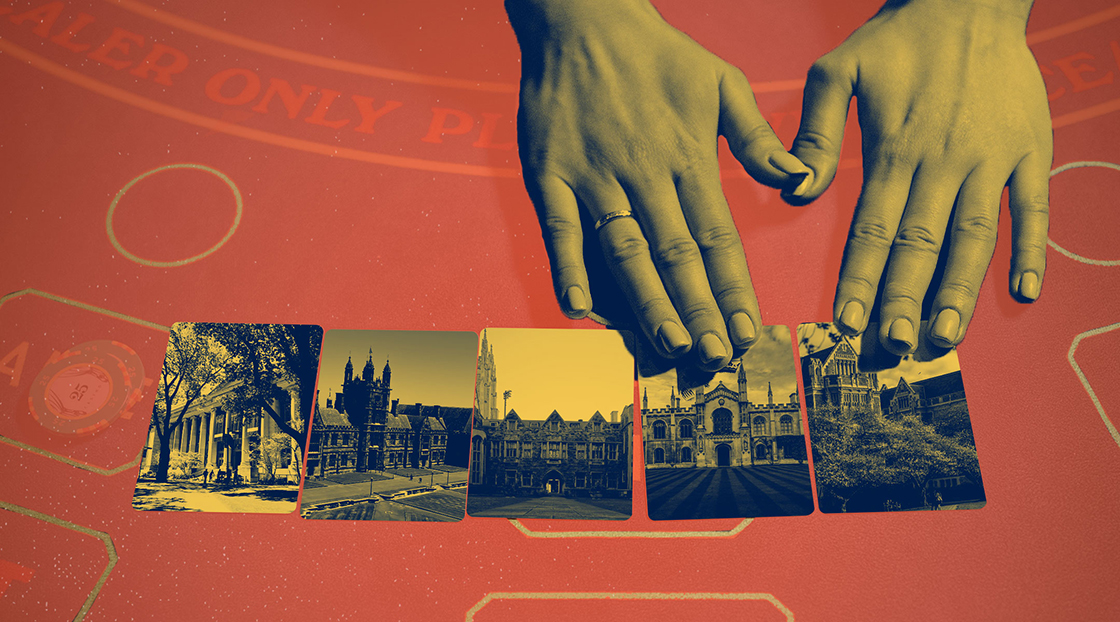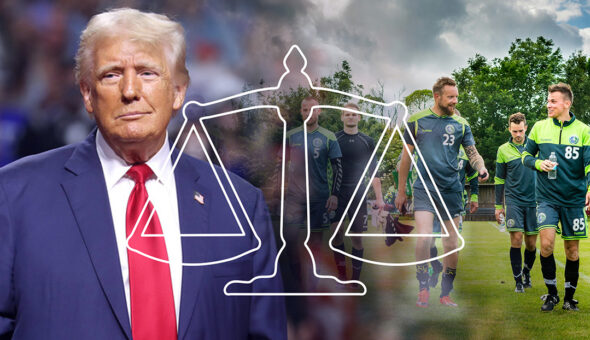Read the full transcript here:
Kevin Tyler:
Higher Voltage is brought to you by Squiz. University websites are filled with great information, but oftentimes, a simple internal site search does not give users the information they’re looking for. Funnelback, the site search product by Squiz, changes the way people engage with content by revolutionizing search. It delivers relevant and comprehensive search results for users, which is key for business objectives. Visit squiz.net. That’s S-Q-U-I-Z dot net to see how Funnelback by Squiz can create a smarter site search option for your institution’s website today.
Kevin Tyler:
Hello and welcome to Higher Voltage, a podcast about higher education that explores what’s working, what’s not and what needs to change in higher ed marketing and administration. I’m your host, Kevin Tyler. Today’s guest is Aaron Basko from the University of Lynchburg in Virginia. Today, we’re talking about a recent article he wrote called The Perils Of A Generic College that I’m excited to chat with him about. Aaron, thank you for joining me today on the show. Before we dive in, I’m wondering if you can give us a brief introduction. Obviously, I said where you work, but how’d you get into higher ed and what brings you to writing this article today?
Aaron Basko:
Thanks Kevin. Yeah. I’m happy to share a little bit of background. I’ve been in higher education in the enrollment space for about 25 years now. I’ve been at five different institutions. So, I love admissions and enrollment, financial aid. I’ve worked in student success and those kinds of pieces as well. I’m originally from Maine, but I’ve moved around to a lot of different states, mostly up and down the East Coast.
Aaron Basko:
And, you know, I think I got started thinking about this article really as I was talking to colleagues from different places and like I said, I’ve worked for a couple different institutions and I think one of the biggest challenges that enrollment managers face is as we’re going out and trying to help students understand who we are as an institution, right, what makes us special enough that a student would want to choose us over somewhere else. And, you know, what I kept seeing was just like, wow, places just seem to be saying the same thing over and over again. Everybody talks about the small class sizes, the fact that it’s a strong sense of community, that professors pay attention to you, that you’re not a number.
Aaron Basko:
And, I thought, wow. You know, how many times can you hear those same talking points before it comes like… As I talked about in the article, it starts to sound like the voice from Charlie Brown, the teacher saying [inaudible 00:02:26]. Right? You know? So, why is it that we struggle with this issue so much when we all know that people respond to clarity? They respond to bravery. They respond to you being yourself and sharing that with the world. And, why is it so hard for institutions to embrace that sense of who they really are when they’re doing some great things and just seem to be struggling to tell people about it in a way that sets them apart?
Kevin Tyler:
I think that’s a fascinating topic and one that I run into quite a bit in my job. I work at an agency. I’ve worked at a couple of agencies that specialize in higher ed branding and marketing and when we would go out for discovery visits… And, still to this day, when we go out for discovery visits, which is the first kind of step in a rebranding… You know, you go to a campus and collect as much information as possible. It was almost like having a bingo card. We would always hear small class sizes. We would always hear beautiful campus. We would always hear the students have their professors’ cell numbers. And, it’s these things that have become kind of a currency that used to be valuable but now has no value because everyone is saying the same thing.
Kevin Tyler:
And so, I’m curious about how you came to the point where you realized this needs to be something I should write down and this needs to be something that should be in the Chronicle of Higher Education.
Aaron Basko:
Yeah. Absolutely. Well, I think part of what made it gel for me was I do some occasional consulting for different institutions and organizations and I went on a consulting visit to an institution in the Midwest that was, I thought, really kind of unique or at least rare in that instead of being really a four-year focus, they focus on the last two years. So, they work with students coming in as transfers from a lot of community colleges and they help them sort of finish off their education to go to a four-year institution, which is a little unusual.
Aaron Basko:
And, as I collected information and I talked to people there, I just got this overwhelming sense of story that this is a place that was really embracing diversity in lots of different forms in terms of the age groups that they worked with, in terms of the needs of students. And, I talked with some of the students there and they were like, “Oh, I love this place. You know, this is like… This represents America to me.” Right? Like, this is a place that embraces you where you are and it has a place for everybody.
Aaron Basko:
And then, as I was talking to the staff from there, they weren’t getting that story. Right? For them, it was just all they knew and so they were like, “Oh yeah. Well, we’re trying to improve in our classes and improve.” And, I’m thinking, you all have a really unique and powerful story to tell and you’re not telling it and I don’t know why. I said, “You know, you all could be saying like we are like America’s new university. Right? We are the new face of true diversity in our area. Right? Or, whatever. Because, we embrace all these different kinds of students.” And, I thought, wow. Okay. Maybe they’re just too close to it and that’s what’s making that hard. But, I thought, okay. If even a place like this struggles to embrace being different than other places, no wonder it’s a struggle to places that are maybe a little bit more traditional in their approach.
Aaron Basko:
And so, I came back from that visit really thinking, you know, what is it that people hear that really means differentiation to them. Right? What is it that cuts through all the noise and kind of diffusion that happens in the areas of marketing and would make somebody actually really pay attention to and say, “You know, that place is really being authentic. They’re offering something different and that’s something that really resonates with me.” So, that’s kind of how I got started.
Aaron Basko:
And, I was sharing that idea with a friend of mine and he was like, “You totally need to write an article about this.” Right? “You know, I think you need to send this in and see if others… If it resonates with other people.”
Kevin Tyler:
Well, it resonated with me, both from a personal and from a professional point of view. I think it feels like oftentimes higher ed has this personality that it is risk averse. Right?
Aaron Basko:
Mm-hmm (affirmative)-
Aaron Basko:
Yeah.
Kevin Tyler:
Like saying anything that’s different than what is in the mainstream means that you are not going to be successful in what you are trying to do when in fact, in the marketing and branding space, being special in those kinds of ways, it actually is valuable. And so, I’m curious why you think higher ed institutions invariably end up sounding interchangeable and [inaudible 00:06:38] generic in their marketing.
Aaron Basko:
Well, I think you hit on part of it being the risk aversion that’s there. Right? In a funny way, as much as I would say that colleges and universities have been a progressive force in society in some ways, in other ways, they’re very conservative entities in the sort of older meaning of that word. Right? They tend to, I think, attract people who like safety, who like things to remain somewhat the same. Right? You know? There’s a little bit of that sense of, okay, this is good. Let’s not mess it up. Right?
Aaron Basko:
And, there’s definitely a risk factor in standing up and standing out. Right? [inaudible 00:07:10] to be… It’s a lot safer to just blend in with the crowd and know that you are checking off all the boxes and it’s going to be okay. Right? And, it takes a certain amount of courage, I think, to be able to stand out and say, “You know what? We’re not going to be for everybody. We’re not going to try to serve everybody. We are going to specialize in this kind of a story or these kind of values and we’re confident that if we plant a flag that the people who believe the same way that we do or value the same things that we do are going to be attracted to that.”
Aaron Basko:
So, I think that’s an identity challenge, but it also reflects the fact that universities are very complex. Right? And, you have a lot of different people who want their part of the university to maybe be the most important or at least get its share of attention. And so, it’s sometimes hard to get people to say, “You know what? It’s okay if I’m not in the front seat but my institution will benefit if we all kind of pull in the same direction.” So, I think there are elements of that in it, too.
Aaron Basko:
I think we… You know, again, it’s just… It takes a little bit of courage to say we’re not for everybody and that’s okay. But, the people that will like us will really like us and that will make us great. So, I think you have to have that kind of vision about it and that kind of confidence.
Kevin Tyler:
I agree. I think the list of factors that play into this kind of generic marketing experience that prospective students have or… The list is long of what those things are and I think one of the other ones that I often think about is the balance of influence between alums and prospective students.
Aaron Basko:
Mm-hmm (affirmative)-
Kevin Tyler:
Donors and prospective students, where alums view their college experience in the way… Like, through the lens of their experience only and then when things start to change, it’s like, “Hang on. What’s going on here? This is what I had.” But, an institution evolving to meet the needs of changing times is a thing that they have to do to remain relevant.
Kevin Tyler:
The other part about it, I think, is that donors, like, wealthy donors especially, have a different kind of influence over an institution’s brand and marketing than a prospective student will. And so, when you see like, “Well, we need to increase our rankings so that I can give you this one million dollars,” like what is… That could be an influential kind of conversation to have from a donor to an institution. But, that is not serving the prospective student in the way that they might need to be… If the brand belongs to so many people, it’s hard for them, for the institution, to have targeted messages that feel authentic.
Kevin Tyler:
Authenticity is one of those words that people say all the time now in higher ed, but at the same time, nothing is authentic because everything is the same.
Aaron Basko:
Right.
Kevin Tyler:
So, I just feel like there’s this catch 22 where you’re chasing this type of success that everyone else is chasing but no one has any new tools or has the bravery or the courage to be different in the race. And, I just find that so fascinating.
Aaron Basko:
Oh, I totally agree. It’s like we’re all trying to fish in the same little spot in the lake. Right?
Kevin Tyler:
Right.
Aaron Basko:
And, it’s not really working for us, I don’t think, very well. And, you know, you mentioned alums and also big donors and I remember hearing somebody at one point talking about websites and talking about that like, yes, you have to make a website that’s for all your different audiences but the only audience that won’t forgive you for not making it about them is prospective students. Right? Everybody else would be like, “Oh, you’re doing that because you’re trying to speak to students.” Right? Your alums will understand that you’re trying to speak to students but your students won’t understand that you’re trying to speak to alums. Right?
Aaron Basko:
So, I think to encourage those folks, your alums and your donors, what you’re doing is exciting because you’re moving forward and you’re chasing the students that you think are really the best fit. I think that is really important. But, you know, you’re right. It’s… It does feel like sometimes everybody’s using the same tools and for me, it doesn’t have to be that way because I think… I think in some ways people are actually… Like, it’s this tug and pull that they have with the concept of marketing. Right? I think there’s this institutional resistance to the fact that we’re selling ourselves as a product.
Aaron Basko:
And so, you get kind of an academic push in one direction, then the marketing push in the other direction, and I think that’s why I’ve always tried to talk with people about this issue as this is really just about telling your story. Right? This is about understanding who you are and what is in your institutional DNA. It’s funny. I was thinking just this morning that I used to work a lot with career development and work with students and I would oftentimes… When I was trying to help them pick out a career, I would suggest that they do this exercise that I called the three movies exercise where I would say, “Okay. Think of your three favorite movies and tell me their plots in just a couple sentences. What’s the basic plot of this movie?.” Right?
Aaron Basko:
And, I would have them tell me that and I would say, “Now, compare those.” And, what you usually find is that the three plots of your favorite movies will be almost identical to each other if you simplify them. And, the characters that you relate to in those movies will be almost identical to each other and you’ll relate in a certain way to that type of character. And, that tells you something about who you are and what you should be doing with your life.
Aaron Basko:
And, I think in some ways it’s the same for institutions. Right? I’d almost like to have institutions go out there and say, “Okay. Find me your three favorite graduate stories.” Right? Your three outcomes that you are the most proud of and that most resonate with who you are and let’s see if they don’t stick together around one central story about what you do and what you bring to the world. And, I think when you do that and you start to collect those stories and you think, “Oh. You know what we do better than anybody else? It’s this.” And, then you can start to tell that story in a way which is not marketing spin, which is not just about coming up with a tagline, but it’s about telling a story that is deeply ingrained in who you are and I think that’s what’s really powerful.
Kevin Tyler:
I agree with you 100% and I think it’s both what you’re saying and how you’re saying it. I mean, there are… We have examples of brands all over the place that are not higher ed brands that have been brave enough to either stand for something, do something different. Tech companies, retail, all these… You know, all these other industries. And, I just find it fascinating that higher ed is so slow to the table when it comes to differentiation. Right?
Aaron Basko:
Yeah.
Kevin Tyler:
We talk about differentiation. We talk about authenticity and realness. And, the fact is is that it’s just still so hard to differentiate for a prospective student to tell which is which. We used to do exercises in another job to where we would take six view books, blur out the name and say, “Do you know which schools these are?.” And, more often than not, no. I don’t know which is which. How would I know that? So, when I see examples like Swarthmore… Swarthmore is a beautiful example of communicating in different ways. They have a view book that is type only. It tells a story. It speaks like the people it’s speaking to. And, it’s a really interesting way to do marketing because you feel seen when you’re reading it.
Aaron Basko:
Yeah.
Kevin Tyler:
It makes perfect sense. But, we’re all chasing this kind of shell prize of make it go viral and let’s do… Let’s do one thing. Or, like, let’s try to make this view book or website please every single person. And, that just… It doesn’t work that way.
Aaron Basko:
No. [crosstalk 00:14:18]
Kevin Tyler:
And so, I think… I wonder about the motivations. Right? I think… I do think rankings play a role in this conversation.
Aaron Basko:
Yeah.
Kevin Tyler:
I’m curious what your perspective is on the role rankings play in the kind of the flattening of higher ed marketing.
Aaron Basko:
Yeah. I was just going to say that. I think we have almost universally, right, conformed ourselves to a role that we see ourselves in. Right? We’ve said, “Oh. Well, we’re on the list of great liberal arts colleges and that means certain things and the only way that we can measure ourself is if we meet those certain things.” Right? Instead of saying, “You know, it’s nice that people picked out a category for us but we don’t like that category.” Or, “We don’t really care about the ways that people are measuring against that category. What we want to be known for is this.” You know, whatever that is. Right?
Aaron Basko:
So, I do think that rankings have been a big part of it. [inaudible 00:15:06]. I get it. They had to start somewhere in getting people into boxes. But, I think that box can’t be the be-all and end-all of what you’re measuring yourself against. It’s… You know, it’s shorthand and I get that’s convenient sometimes but I think it’s to the institution’s detriment to say, “Hey. Okay. We accept that box and now we have to play by the rules of all the institutions that are on that box.” You know?
Aaron Basko:
I think it’s much more important to say, “Great. Let people put us wherever they want on that. Let us decide what we want to be measured by and then let us move forward to see if we can do that better.” Right?
Aaron Basko:
You know, I really enjoyed… I’m relatively new at the University of Lynchburg, but I… You know, I talk about in the article this is a place where we’ve got one of those giant Virginia love signs in the middle of our campus. Right? And, for anybody from Virginia, they’re like, “Oh yeah. It’s a Virginia love sign.” But, for us, it’s like this is our heartbeat. Right? Like, I always joke to kind of, you know, love is in our blood because I look back into the history of the institution and this is a place that was founded by a particular Christian denomination at the time and their whole thing was service to the community and service to others. Right? And, it was… That was like what you were supposed to do and that’s what people gave money for. You know?
Aaron Basko:
And so, even though the institution has sort of evolved away from some of that identity, you still feel that every day on campus. There’s so many service pieces to what people do here and I… I just… You know, that really resonated for me. Right? And so, there’s an example of a story that’s like, what a great story to tell. Right? I mean, you know, this is what’s important to you as a value. And, some people will resonate with that and other people won’t and they’ll say, “Well, that’s nice but that’s not for me.” And, that’s okay. Let those folks go. Right? But, work with the people who say, “Yes. That’s what’s in my heart too and let me… I want to become and be part of that story.”
Aaron Basko:
And, that’s really who you’re trying to attract. Right? I always think about it as you have this big sort of umbrella story that the institution puts out that says this is who we are and this is what we value and then it reaches out to students and says, “Come bring your story into our story. Help us build our story by you bringing your individual story under this umbrella.” And, I think that’s where the magic happens. Right? That’s what makes… That’s something that everybody can feel good about and the institution can move ahead in that way.
Kevin Tyler:
Yes. I think… I couldn’t agree with you more. I think that the role of a brand is about more than just recruiting students, especially in higher ed. It’s not just about recruiting students. It’s about recruiting faculty, staff, leadership, every… Like, everyone who is there is there because they believe in what you are doing, hopefully, and that’s part of a brand’s job, is to communicate what you believe in, what you stand for and who you are in the world and who you’re for in the world. And, if that is not clear, people… It becomes almost impossible to make a decision.
Kevin Tyler:
I think often about the clients that I have had in my time in higher ed marketing and branding who have said, “We want to be bold.” And then, we give them bold things and like, that’s way too bold. We can’t. We can’t do that. That’s wild. [inaudible 00:18:02] too much.
Aaron Basko:
Yeah.
Kevin Tyler:
But, what… The capacity for too much or the space for too much in higher ed is like endless because what we’re doing now is just not… Is not now. So, to the point of recruiting not just prospective students but also faculty, staff and leadership, I think about marketing as an amplifier of what’s happening on campus and marketing can only tell the stories of what’s real. Right? This is… We’re not trying to make up things, whatever else. And so, that brings me to the point of strategic plans, which are now becoming marketing tactics as opposed to guiding documents. You see a… You can find a strategic plan on any higher ed website today and they are positioned as marketing items.
Kevin Tyler:
And, there’s recent articles, as recently as last year, about how similar these strategic plans are starting to sound. They’re all using the same buzzwords. They’re all after the same kinds of successes. And, I’m trying to figure out if it’s the marketing that’s making institutions sound generic or is it the way that institutions are thinking about the future that marketing then has to amplify in messaging that is making them all sound generic.
Aaron Basko:
You know, that’s a great question. I love that question because we know that institutions are different in the things that they offer. We know that students have a different experience there. So, if the institution itself is not the same, then what is it? There’s got to be… At least to some degree, it has to be the marketing. Right? And, the story that you’re telling. But, I do think what you’re getting to as well is that there’s something behind that marketing. Right? It’s not people sitting in the marketing office just making things up and putting it out there. Right? If they’re taking their cues from what’s put into that strategic plan. Right? They’re only going to market what the institution says this is what we say is important to us.
Aaron Basko:
And so, at some point, you are maybe not being bold enough in your strategic planning or you’re, like you’re saying, choosing the same buzzwords that everybody else is choosing. Right? So, for a while, it was like, okay, the way we’re going to be successful in the world is if we just add more majors because we just need more… You know, if we’ll do that, then people will come to us and they’ll be more demand. And so, everybody put into their strategic plans, okay, that we need to grow our majors. Right? Or, we need to diversify in this way or we need to become more international or more graduates or whatever. You know?
Aaron Basko:
So, I think people follow in these trends of whatever’s hot at the time that they feel like, okay, that will be the key to really making us stand up above others. And, I think they… Those pieces tend to sometimes be much more tactical than actually strategic. Right? They’re more about like how you do things rather than why you do things. And, I think there’s a lot of room to back up and say in the strategy like, “Okay, you know, who are we really going to be?.”
Aaron Basko:
I think one of the big challenges is that comes is… You know, one of the most natural places to differentiate is by choosing sort of what areas of study you’re going to offer and which ones you’re going to excel in. Right? So, some of the clearest examples out there of people, places that are differentiated are done so by major. Right? Like, I always think about Johns Hopkins. Right? Well, nobody has to tell you what Johns Hopkins decided they were going to put front and center in their story. Right? Or, Babson. Right? In the business world. I mean, those are clear examples of differentiation but they are academically based and I think that’s really challenging in a lot of institutions because, again, people say, “Uh oh. If I’m not in the front seat, then I’m way in the back.” Right?
Aaron Basko:
And so, how do…? You know, how can institutionally you get the benefits of having some areas of relative greatness without leaving other people out? And, I think that can be a real challenge.
Kevin Tyler:
I think that that’s definitely worth a conversation and I think what we know or what is suggested is that institutions with [inaudible 00:21:51] programs that both spotlight majors that they are known for… The halo effect is that some… The other majors get a lift as well because people know that it’s a great school in this. And so, just because you put a mat out and say we’re great at engineering or design, whatever it is, doesn’t mean that you’re only going to get people who want to be engineers and designers. You’re going to get a bunch of other kinds of people too.
Kevin Tyler:
And so, I understand among faculty how that kind of turf kind of conversation can occur. But, understand that we’re all trying to lift up the same institution and we work in the same place and we’re a team. And, I know that feels idealistic and kind of quixotic, but that’s the nature of the beast. Right? If this program is strong, let’s use that power to lift up the other programs on campus. And, I just think that that’s an important conversation to have because you can’t be everything to everybody, especially not all the time.
Kevin Tyler:
I had a colleague back in the day who I still think is one of the most hilariously brilliant people who used the analogy of ping pong balls. Right? So, if you’re… You’ve got 16 ping pong balls and you throw them at one person, the likelihood of them catching any of them is pretty slim. But, if you have one ping pong ball and that’s the targeted message and you throw that at the person, the likelihood of them catching that message is significantly higher. And so, when you have all of these things and trying to do all of the social and be everything to everybody, you’re diluting all of your efforts, especially your brand’s efforts.
Kevin Tyler:
And so, I just… I think about that a lot.
Aaron Basko:
[crosstalk 00:23:16]
Kevin Tyler:
I think about that a whole lot.
Aaron Basko:
That’s a great analogy and I think about something similar to that. I sometimes think about it as like you’re trying to shoot a target. Right? And, get something to like… Something to stick into the target and actually stick. Well, are you going to shoot an arrow which has a point which is narrow and focused? Or, are you going to throw a thing of cotton candy at it? Right? It’s just not going to… Like, it’s not going to go.
Kevin Tyler:
Exactly.
Aaron Basko:
And, you know, the other analogy I use a lot and I talked about in the article is the idea of having a big tent. Right? I say, well, okay, there are two types of tents. Right? Out there. You can have a tent which is only built outside with four foot poles all the way around. Right? And so, you know, it’s… Four foot high is how high you can get under it. Or, you can build a tent and you could have three 12 foot poles and all the rest four foot poles around the outside. Well, which one are you going to be able to get under? Right? Like, which one is going to welcome people in? Right? And, by allowing there to be some height into it, everybody gets to stand taller because you have a few places that are sort of leading the way.
Aaron Basko:
And then, you know, everybody else benefits. Right? Nobody’s going to look at Hopkins and say, “Well, I’m sure medical programs are their only good programs.” Right? It’s just not going to happen. And so, you’re right. The halo effect, I think, is something that if we could get over the initial give, we would get a lot more than we give, I think.
Kevin Tyler:
I agree with you. I agree with you.
Kevin Tyler:
I want to kind of see if there are institutions in the world that you’ve come across that are compellingly differentiated in the market. I know I can think of a couple, but I want to see if… Which ones come to mind for you.
Aaron Basko:
Yeah. Well, I mentioned a couple [inaudible 00:24:50] based on their sort of academic piece and so I think those are somewhat natural. I mean, obviously you have places like Thunderbird, right? That, you know, that… I mean, everybody just knows them for kind of one thing. Right? But then, you know, again, there are other places that I think are… They’re differentiators in waiting. Right? They’re places that actually are doing really good things. Right? Like the place that I mentioned earlier that I had gone and done some consulting work for was Governors State in Illinois. And again, I think that they’re not on everybody’s list but they could be well known if they sort of embraced that really unique characteristic of who they are.
Aaron Basko:
So, again, I think… I think it’s places that just say this is who we are and we’re okay with that. You know? And, you know, love us or leave us. But, that’s… I don’t know. I’m curious to hear what places you were thinking about.
Kevin Tyler:
I think of places like Paul Quinn College in Texas. It’s a historically black college led by a man named Michael Sorrell who I’m a huge fan of anyway. But, he is very clear and the institution’s very clear about who they serve, how they serve them and what their mission in education is around reducing debt, around student workers and the importance of getting that experience. They do that in a very, very intentional way. They have a very interesting history as well.
Kevin Tyler:
I think about Bentley University in Waltham. They are very, very clear about who they are as a business school but also with a liberal arts spin. I think about Otterbein College and their leader John Comerford who’s been on the show in the past and the way that they focus on being student-centered and lifting up students and assisting and providing the support they need in order to be successful.
Kevin Tyler:
There are just these places that are starting to pop up who coincidentally… Probably not. But, coincidentally have also kind of eschewed kind of rankings. Right? John Comerford is not really concerned about rankings. He’s more concerned about the success of his students and I think the more colleges that pop up and say here’s who we are, here’s who we serve, here’s what we care about, here’s how we exist socially, politically, whatever else, those are the places and those are the brands that will get the people they want. Yes, they will lose some folks but the people who leave you didn’t love you enough in the first place.
Aaron Basko:
Right. Right.
Kevin Tyler:
And so, you want the people who want to be with you no matter what and those are the most valuable audience members ever who know and believe what your mission is.
Aaron Basko:
And, they make the best alums. Right? I mean, you want to recruit people that have the same hearts so that they can go out into the world and share that same heart and then when people look at them and say, “Wow. You know, this is really… You know, this person’s really amazing.” And, you talk to that person and they’re like, “Well, I learned that here.” Right?
Kevin Tyler:
Right.
Aaron Basko:
Got mentored in that here. You know, those are the people that you point to afterwards and say, “This is what we are all about.” Right? You know, I think about… You know, here I talked about serving other people and making a difference and I was really impressed when I got here that University of Lynchburg’s most famous alum is Setsuko Thurlow. She was a Nobel Peace Prize winner for nuclear disarmament. It just fits right in the story. Right? And, you tend… You’re going to attract the people who have those same gifts, then you’re going to help nurture those and send them out into the world.
Aaron Basko:
And, yeah. If they’re a person that’s just attracted to where you’re ranked, well, you know they would trade you in for someone else. You know? On another day, right?
Kevin Tyler:
Right.
Aaron Basko:
I mean, they’d just say, “Oh. Okay. Well, it’s all about… It’s all positional.” So, if you weren’t ranked there, they would be happy to be with someone else. Right? And instead, you’re attracting people who are like, “No, no. I get this place and this place gets me.” And again, I think those are the alums that you want to have who come back to you and say this place changed my life. You know?
Kevin Tyler:
Yeah. Totally. Totally.
Kevin Tyler:
What do you see as some of the easiest ways? I know you talked about some of them, like kind of philosophically or theoretically. But, what are some of the easiest ways that you think institutions can start to differentiate themselves from each other, knowing that the product, the end product, is all basically the same? Essentially the same.
Aaron Basko:
Mm-hmm (affirmative)-
Aaron Basko:
Mm-hmm (affirmative)-
Aaron Basko:
You know, one of the things I always try to challenge myself on as I think about, okay, when a visitor of any kind comes to campus, right, whether that’s a prospective student or an alum or somebody from off campus in the community or whatever, what are the three things that I would like that person to leave our campus having experienced or heard about? What are those most important three things that I think universally everybody should know about us? And, I think that starts the ball rolling because then… Then, you can look and say, “Okay. Well, how do academic pieces fit into that?.” Right?
Aaron Basko:
So, we talked about you can… You know, you can definitely pick and choose some areas that you think you have some areas of excellence. I think you can also embrace your location. I think is… You know, one of the few things that’s definitely different place to place. Right? You can take a great liberal arts college but they are all located somewhere different. And so, to be able to say this is how we embrace our location and this is why that location can also be a benefit to you. So, I think that’s another thing you can look at and say, what does that do for us and how does that make a difference?
Aaron Basko:
And then, I think, you know, you… Looking backward into your history is really important, too. I think a lot of places, they got to a certain point and they were like, “Oh, no, no. We’re just looking forward. We want to be this kind of institution so we’re going to forget our past because maybe we’re not as proud of it as we would like to be.” And, I think that’s a mistake. I think oftentimes the easiest way to find your differentiating story is to look back and say, “Wow. This is where we came from.” Right? I worked at a great institution about 15 years ago that was one of the earliest colleges in the nation and they were actually founded because all of the great schools were right on the coast and so people who were a couple hours inland, they didn’t have anywhere to go. Right?
Aaron Basko:
And so, people in those areas needed doctors and lawyers and clergy and that kind of stuff, and so, this institution became like the place for building up professionals inland from the coast. And, I mean, what a wonderful history to embrace. Right? And, to say, “Look, we were… You know, that’s who we were and this is our leadership and this is how we want to roll it forward.” So, I think looking backwards into your past will tell you where you need to go in the future. And, you don’t need to keep everything, but figure out where the heart is and keep that and then translate into today’s way of displaying those values.
Kevin Tyler:
It’s really an interesting point that you make. I agree with you. I think that there are opportunities to look back into the past and distance yourself from that as well as a way to differentiate. I mean, [inaudible 00:31:21] even having the last two years, these conversations around Civil War statues and removal on campuses and I think the historical part of understanding evolution is like institutions change and this is not who we are anymore and acknowledging that and changing for the future as opposed to staying the same for the past is such an opportunity for institutions. Right?
Kevin Tyler:
Obviously, we can’t get away from the education space from kindergarten through secondary from being politicized. It’s now in a politicized state. But, understanding who your audiences are and what they care about and making decisions that meet their needs and not the needs of your donors or alums because they are no longer part of the wave of people coming in. Yes, they are part of your community but are they your primary audience? Hopefully not. And then, you can make decisions based on that.
Kevin Tyler:
And so, yes. I agree with you about the historical part even if you’re not proud of it and make new decisions to be better and a better institution because of it.
Aaron Basko:
Yeah. I think that’s a great point because if you’re an institution, if you’ve been around 100 years, you’ve made some mistakes. Right? You’ve made some bad choices somewhere and kind of got off the track somewhere. And so, to look back and say, “Hey, this is what we did well or this is what was noble in the way that we started. Here’s where we missed. Right? And, here’s where we did it wrong. And, how can we keep what is noble but look to be better?.” Right? And, say we’re going to learn from our mistakes but we’re going to take our best self and continue to evolve it.
Aaron Basko:
And, I think again that goes back to that sense of risk aversion or concern with making change. Right? It’s… You can change a lot of things about yourself and still keep some of those heart values that you hold dear and that’s… And, you should be, right? You should be actively working on yourself as an institution to be constantly making yourself better. I think you start to get into trouble when you think, “Hey, we’ve pretty much arrived. You know? We’re here.” So.
Kevin Tyler:
Exactly.
Aaron Basko:
You know?
Kevin Tyler:
Exactly. I think a lot of times, especially now, it feels like higher ed views marketing in such a way that the things that got us to where we are today are going to just… Just keep doing those things and we’ll stay okay. And, that’s just not the case anymore.
Aaron Basko:
Mm-hmm (affirmative)-
Kevin Tyler:
And so, what the industry and the market requires is bold thinking, new strategies and to me, an evolved vernacular because a lot of the words that you even use in higher ed are just strange words, like…
Aaron Basko:
Nobody else understands them. Right? Yeah.
Kevin Tyler:
Right.
Aaron Basko:
And, it’s just weird.
Kevin Tyler:
[crosstalk 00:33:49]
Aaron Basko:
Yeah.
Kevin Tyler:
Very strange. And so, I think moving forward into the future, higher ed’s going to have to decide who it is for.
Aaron Basko:
Yeah.
Kevin Tyler:
And, market distinctly to those people. And, I think that’s just the only way around it.
Aaron Basko:
I think one of the big challenges too is that even as we’ve worked on marketing, I feel like a lot of the times, we’re talking to ourselves. We’re not actually talking to our audience. We’re not listening and saying, “What did they need to hear? What would be the most helpful to them?.” We’re using marketing as a way to kind of bolster up how we feel about ourselves. Right? And, oh, of course we’re like this and of course we, you know… And, I think that’s a real mistake. You know, we need to be… I think we need to have the humility to say, “Look, this is not about us. Right? This is about the students that we serve.” And, I think if we listened well and thought about that external audience as just as important or as more important than our internal audience, I think we would do marketing differently. So, I’m not sure yet what that looks like, but I think there’s something important there for us to explore.
Kevin Tyler:
I agree with you 100%. I’ve been on the soap box for a while now that the tech industry actually has commandeered the higher ed message in terms of like be your creative self, bring your whole self, this is your space to create whatever you want and forge a path. All the words that we use in our marketing materials but kind of as a actual real life.
Aaron Basko:
Mm-hmm (affirmative)-
Kevin Tyler:
Really? Tech has that in spades. Right? Like, energetic ads, energetic copy, and this desire to stay like prim and proper in higher ed means that the competition just looks a little different and it kind of looks boring.
Aaron Basko:
Yeah.
Kevin Tyler:
And, higher ed is anything but that. The research and innovation and problem solving and the forwardness that higher ed brings to society, that should all be captured somewhere. Like, it’s an exciting place when you want it to be exciting.
Aaron Basko:
It is.
Kevin Tyler:
So, yeah. I totally agree with that. There are opportunities that exist all over the place for higher ed to borrow from other industries to amplify their stuff.
Aaron Basko:
Absolutely. Well, and all you have to do is look at some of our basic documents to see that in action. Right? I mean, when you look at a course catalog, right? Or, [inaudible 00:36:02] a university catalog. Clearly, that is written for an internal audience and not for people on the outside because nobody talks like that. Right? I mean, there are just so many examples of that and I think you’re right. We shouldn’t seem boring to people. We should seem like it really empowering and I think we have not captured that a lot of the time. We feel sort of stuffy and we feel sort of lost in our procedures sometimes and instead of saying, “Look, well, this is about you and how we can partner with you to help you kind of figure out where you want to go.”
Kevin Tyler:
Yeah. Yeah. I think more of those kinds of conversations are going to be really necessary.
Kevin Tyler:
Aaron, this has been a pleasure. Is there anything else that you would like to mention that we have not asked about? What are you working on next? Are you doing more thinking in this space of not being the generic university? What’s coming up?
Aaron Basko:
Yeah. I really… I do continue to think about differentiation and opportunities for institutions to create change. I’m working right now on an article talking about how to help make universities better places to work and how you can help employees experience them in a different way that I think very much ties in with this area of differentiation. And, I’ve been having a lot of great conversations with faculty and things like that too, especially in some of the liberal arts and sciences area, talking about, okay, you know, why do people sort of not understand all the great things that they’re doing. So, really, in some ways, my differentiation conversation… I had a couple of colleagues who said, “Oh, you know, that article [inaudible 00:37:34]. I want to talk more with you about that because how can we differentiate what it is that we’re doing and tell our story in some great ways?.”
Aaron Basko:
And so, I’ve been thinking a lot about some of those really classic majors and the many things that they offer to students that right now we’re just not telling that story well either. So, I’m excited to keep this conversation going.
Kevin Tyler:
Yeah. Me too. I think that will be really exciting, especially that work piece as well. Are you on social? Where can people find you?
Aaron Basko:
I am. Certainly LinkedIn. I’m very active there. I don’t do as much other social, but I would say definitely find me on LinkedIn and if you see this article or others, I mean, feel free to send me notes or comments. I’d love to hear if it resonates with you or if you have other thoughts. I mean, I really… I feel like there’s such an opportunity to do more for this profession that we all know and love. Right? And, I think if we all put our great thinking together about this, we’re just going to be able to continue to be proud of the work that we do and the benefits that we offer our students.
Kevin Tyler:
Aaron Basko, it’s been a pleasure. We will have a link to your article, Stop Playing It Safe: The Peril of The Generic College, on our episode page. Thank you so much for joining me today, Aaron. I really appreciate it and can’t wait for this to go live to share with the world.
Aaron Basko:
Thanks for having me. I appreciate it.
Kevin Tyler:
No problem.
Kevin Tyler:
That’s it for this week’s episode of Higher Voltage. We’ll be back soon with a new episode and until then, you can find us on Twitter at Volt Higher Ed. You can find me, Kevin Tyler, on Twitter @KevinCTyler2.








